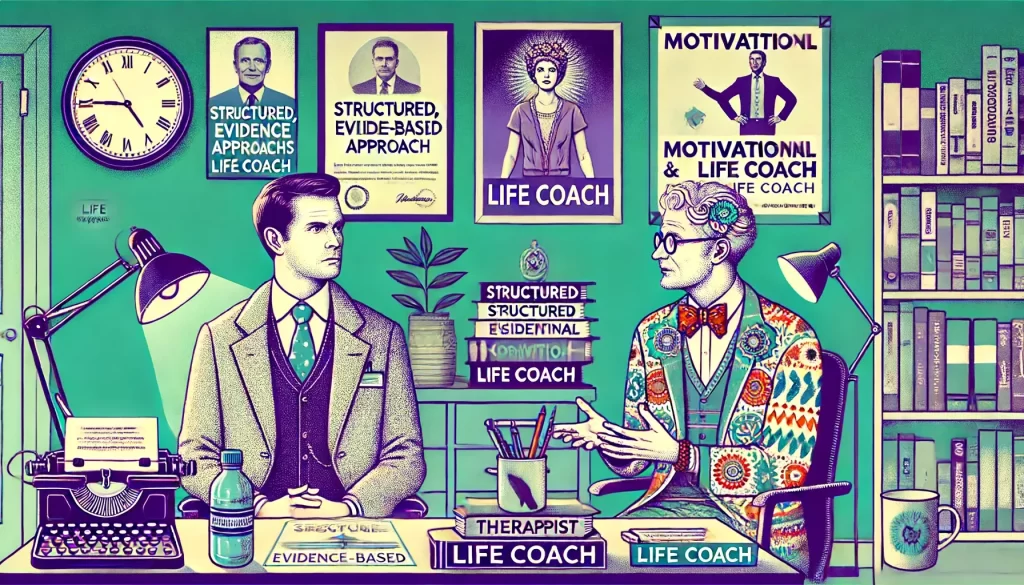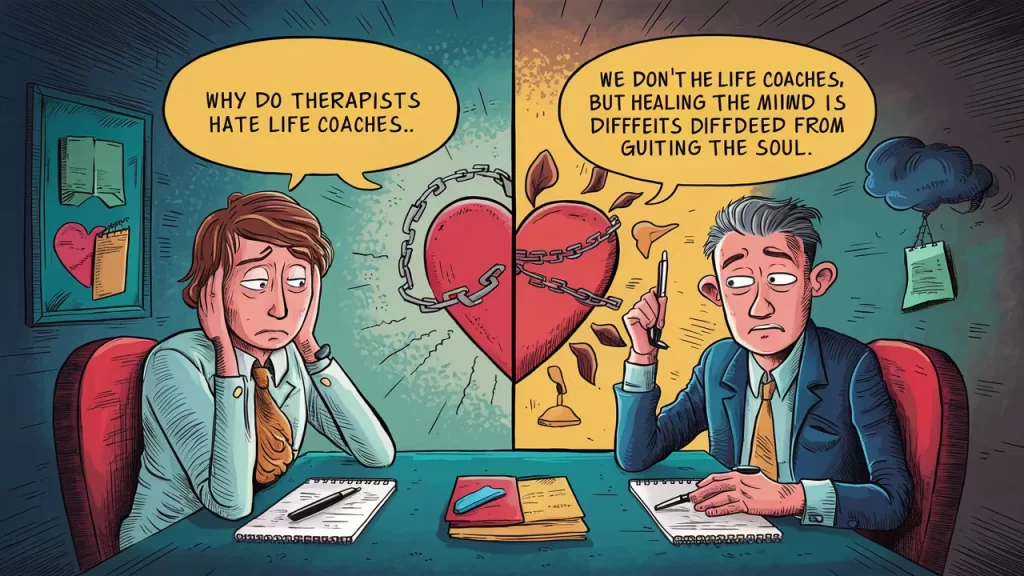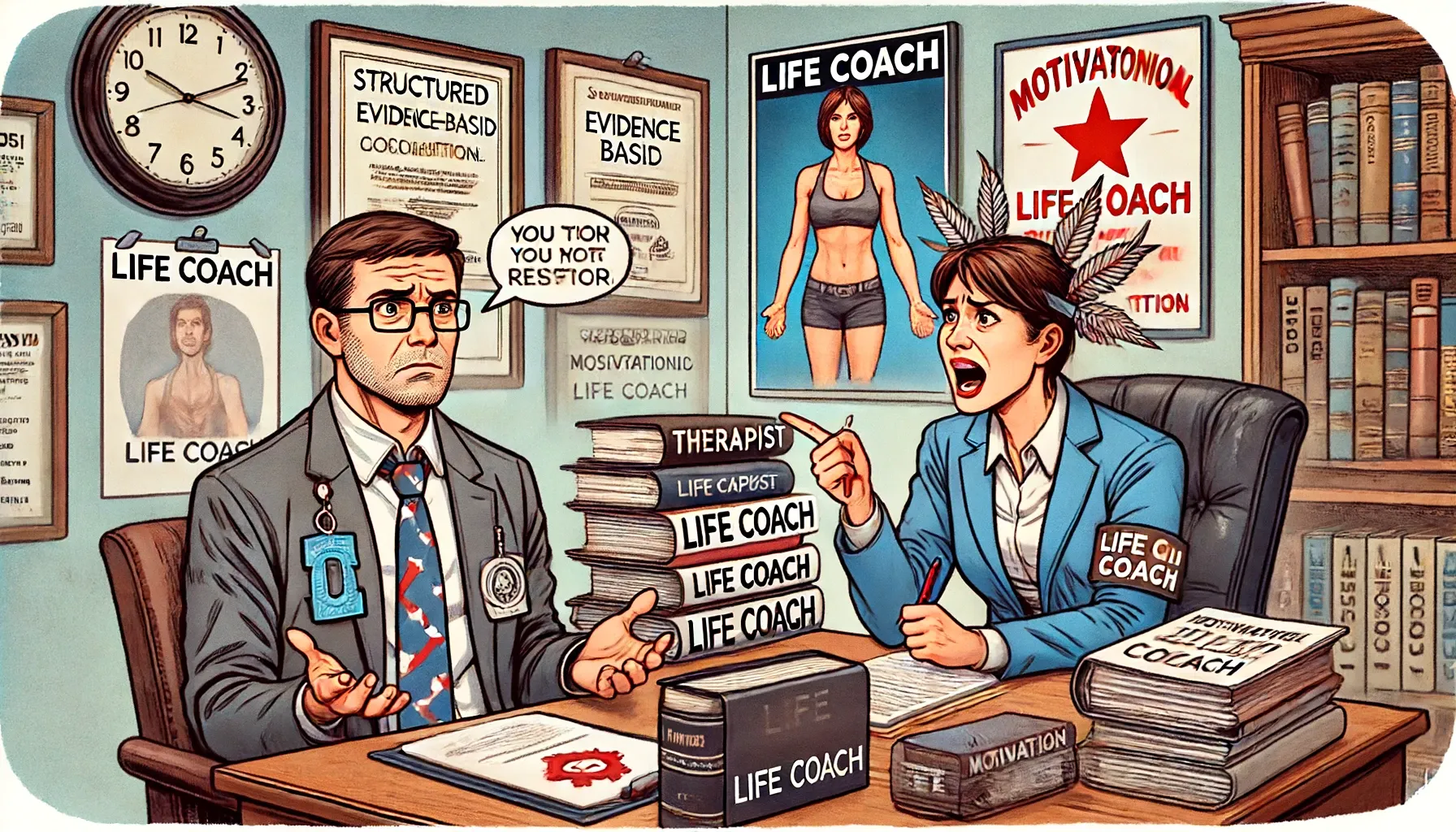In the world of mental health and personal development, there’s a burning question that often sparks heated debates: “Why do therapists hate life coaches?” It’s no secret that many therapists harbor some animosity towards life coaches, but what’s the real story behind this professional rivalry?
Let’s dive in and explore the complex dynamics at play.
As someone who has worked with both therapists and life coaches, I’ve witnessed this tension firsthand. I’ve heard therapists dismiss life coaches as “unqualified hacks” and life coaches accuse therapists of being “stuck in the past.
” But the reality is, like most conflicts, the therapist-life coach divide is fueled by a mix of legitimate concerns and misunderstandings on both sides.
In this article, we’ll untangle the reasons behind the rift and consider how the two professions might find common ground.
Therapists vs Life Coaches: What’s the Difference?

Before we examine why therapists hate life coaches, it’s crucial to understand the key differences between the two roles. Therapists are licensed mental health professionals who diagnose and treat mental illnesses using evidence-based techniques.
They typically have advanced degrees in psychology, counseling, or social work and are required to complete extensive supervised training.
On the other hand, life coaches are not mental health professionals and do not treat mental illnesses. Instead, they help generally well-functioning clients achieve personal and professional goals through guidance, support, and accountability.
Life coaches may have backgrounds in various fields and often complete certification programs, but there is no universally recognized governing body for the profession.
While therapists and life coaches may use some similar techniques, like active listening and goal-setting, their roles are distinct.
Therapists help clients work through past traumas, manage mental health conditions, and develop coping skills. Life coaches focus on the present and future, helping clients clarify their goals and create action plans to achieve them.
Read also: Why Is The Powerball Website Blocked?
Why Many Therapists Don’t See Eye to Eye with Life Coaches

So, what’s behind the therapist-life coach tension? Here are some of the main reasons therapists may dislike life coaches:
1. Lack of Regulation and Standardized Training
One of the biggest concerns therapists have about life coaches is the lack of regulation in the coaching industry. While therapists must meet strict educational and licensing requirements, anyone can call themselves a life coach without any formal training or oversight.
This lack of standardization means the quality and approach of life coaches can vary widely, which therapists fear could lead to harm if coaches overstep their boundaries and attempt to treat mental health issues.
2. Encroachment on Therapists’ Territory
Some therapists view life coaches as a threat to their profession, worrying that coaches may lure away potential therapy clients with promises of quick fixes and less stigma. This fear is not entirely unfounded, as life coaching has grown rapidly in recent years, with more people seeking personal development outside of traditional therapy.
However, it’s important to note that therapy and coaching serve different needs and clientele. Therapy is appropriate for those struggling with mental health issues, while coaching is best suited for high-functioning individuals seeking personal or professional growth. In reality, the two services can be complementary rather than competitive.
3. Disagreements Over Approach and Methodology
Therapists and life coaches often have different philosophical approaches to helping clients. Therapists tend to focus on exploring past experiences, emotional processing, and developing long-term coping strategies.
Life coaches, on the other hand, often take a more action-oriented, solution-focused approach, emphasizing goal-setting and accountability.
Some therapists view the life coaching approach as superficial or overly simplistic, arguing that it doesn’t address deeper psychological issues. They may also criticize life coaches for using techniques drawn from pop psychology without a strong evidence base.
However, proponents of life coaching argue that their approach is effective for clients who are ready to make changes and don’t require the depth of traditional therapy.
Bridging the Divide: How Therapists and Life Coaches Can Coexist

Despite the conflict between therapists and life coaches, there is room for the two professions to coexist and even collaborate. Here are some ways to bridge the gap:
Increased Regulation and Training Standards for Life Coaches
One way to alleviate therapists’ concerns about life coaches would be to establish more transparent regulations and training standards for the coaching profession, ensuring that coaches don’t misrepresent their qualifications.
This could include requiring coaches to complete accredited certification programs, adhere to a code of ethics, and clearly define their scope of practice.
The coaching industry can build trust and credibility with mental health professionals by increasing accountability and standardization.
Greater Collaboration and Referral Networks
Therapists and life coaches can benefit from collaborating and building referral networks. For example, a therapist could refer a client who has made significant progress in therapy and is ready to focus on personal growth to a trusted life coach.
Similarly, a life coach could refer a client who is struggling with mental health issues beyond their scope to a qualified therapist or psychologist. By working together, therapists and coaches can provide a continuum of care that meets clients’ diverse needs, ensuring that clients receive appropriate counselling when necessary.
Educating the Public About the Differences
Much of the tension between therapists and life coaches stems from public confusion about the two roles, with many therapists expressing a dislike for life coaches. By educating clients about the distinctions between therapy and coaching, therapists and coaches can help people make informed decisions about which service, such as counselling or psychotherapy, is right for them.
This can involve communicating the scope and limitations of each profession and the types of issues they are qualified to address, including those that therapists who don’t specialize in coaching might handle.
Choosing the Right Professional for Your Needs
Ultimately, the most important thing is for individuals to choose the professional, whether a psychologist or a life coach, who best fits their specific needs and goals.
If you’re struggling with a mental health issue like depression, anxiety, or trauma, a licensed therapist or psychotherapist is likely the most appropriate choice.
They have the training and expertise to diagnose and treat these conditions using evidence-based methods, as many therapists are trained.
On the other hand, if you’re generally mentally healthy but feeling stuck or unsure of your direction in life, a life coach may be a good fit.
They can help you clarify your goals, develop a plan of action, and provide support and accountability as you work towards them, much like a counsellor would.
Some people may benefit from working with a therapist and a coach at different journey stages.
When choosing a therapist or life coach, it’s essential to research and find a reputable professional, such as a psychotherapist or counsellor, who aligns with your needs and values.
Look for someone with relevant training and experience, such as a licensed counsellor or psychologist, positive reviews or referrals, and a personality that feels like a good fit.
Be bold and ask questions about their approach and what you can expect from working with them, especially regarding their counselling methods.
The Bottom Line
So, why do therapists hate life coaches? The answer is complex and rooted in concerns about regulation, competition, and differing approaches.
However, by increasing accountability in the coaching industry, fostering collaboration, and educating the public, therapists and life coaches can learn to coexist and even work together to help clients thrive.
At the end of the day, both therapy and life coaching can be valuable paths to growth and self-improvement. The key is to choose the professional that aligns with your individual needs and goals.
By understanding the differences between therapists and life coaches, you can make an informed decision and take the first step towards a more fulfilling life.
If you’re considering working with a therapist or life coach, I encourage you to explore your options and trust your instincts. Whether you’re seeking a therapist to help you heal from past wounds or a life coach to help you achieve your dreams, there is a professional out there who can support you on your journey. The most important thing is to take that first step and invest in your growth and well-being.

